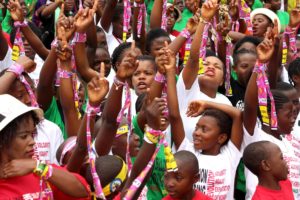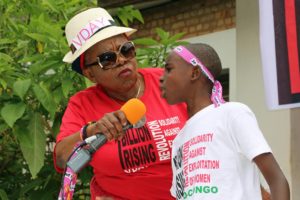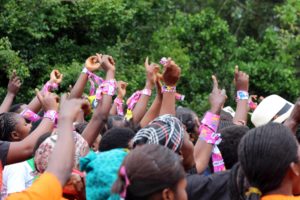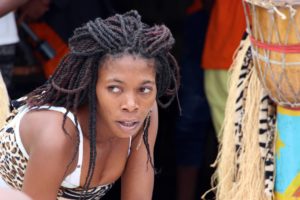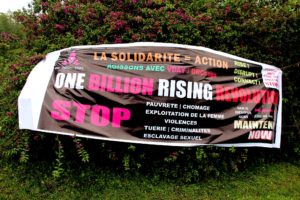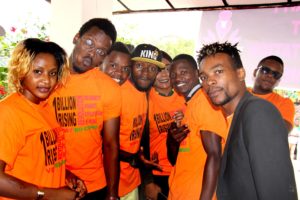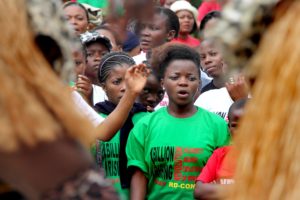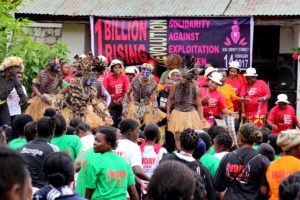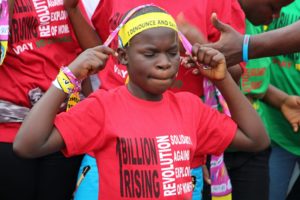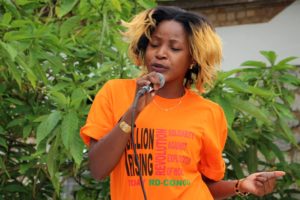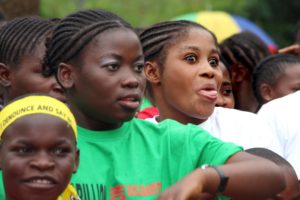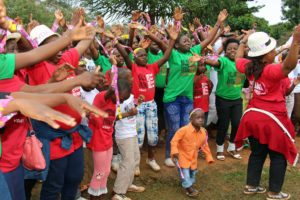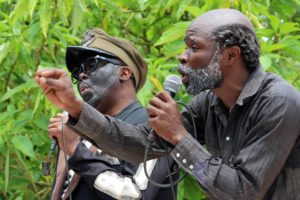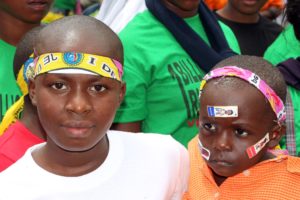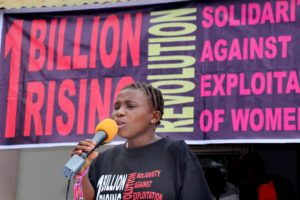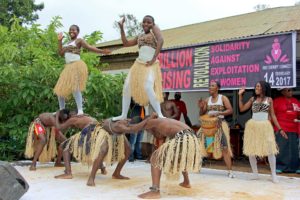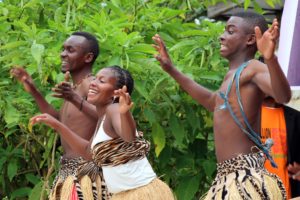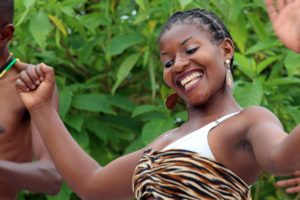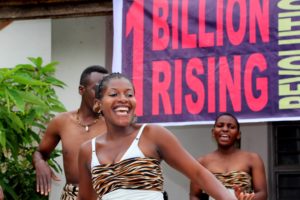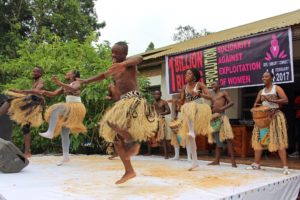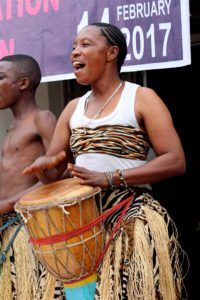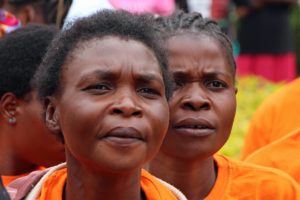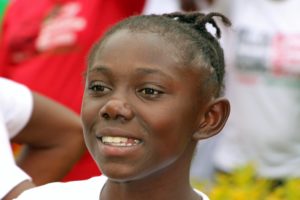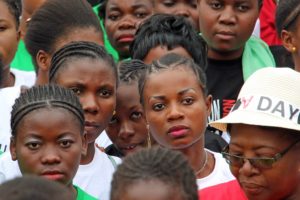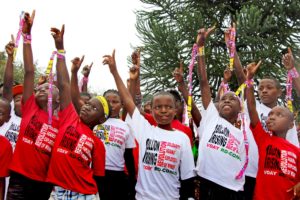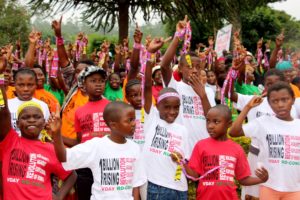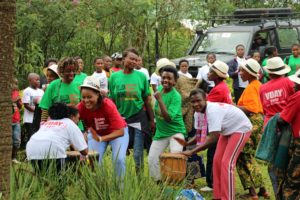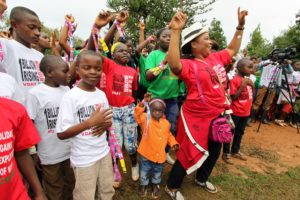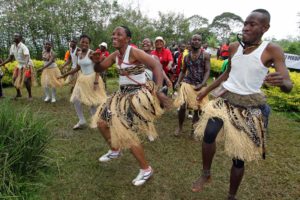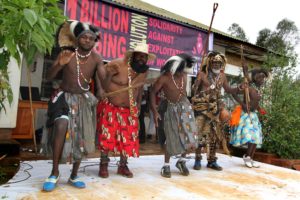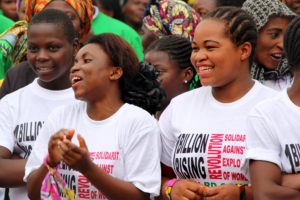
March 17th, 2017 was the third rising that City of Joy organized since February 2017 after the rising with over 120 secondary school pupils and hundreds of parishioners who stood and rose against patriarchy and exploitation of women and girls and who understood the meaning of solidarity for women. The rising of this year reached national level. In Kinshasa the rising was organized by an activist, Marie Omba, and Matumaini Center. Matumaini center is a center for children which ensures education and training of young girls and ensures their schooling to reduce teen pregnancies and increases literacy for women. It is also a center which empowers women through professional training.

One Billion Rising In Solidarity Against the Exploitation of Women, Kinshasa DRC
The rising was a call for a revolution against the exploitation of women in society, labor places, schools, churches, etc. It was a call for unity so as to prevent patriarchy from winning. It was a call for action to stop oppression, exploitation, and discrimination of women. The day was a day to start a new journey of solidarity on which selflessness and sacrifice should characterize risers.

From all forms of violence against women, we rose to explain that solidarity is a potent weapon of REVOLUTION because when women are not united and are unorganized men-domination wins.
The day of the rising was the day to awaken the consciousness of the risers on the issues of violence against women and girls across the planet in general and in DRC in particular. It was a day to invite risers to understand the different struggles fought by women all over the world and own these struggles as their own struggles in order to attain the objective of forging a world of gender balance.
March 17th was a day of sharing the feelings, the pain and suffering of afflicted women who have lived under the yoke of violence in their homes, churches, and labor places, and express the rage of solidarity to prevent that violence from happening. It was a day of expressing solidarity as an act of love for women and respect for their dignity. It was a day to honor women and praise their courage and resistance to violence.
City of Joy listened to and rose with the youth in a conference, adults (men and women) in a church and had documented all forms of violence these people go through. City of Joy also listened to children who are affected by some forms of violence which are perpetrated by their parents and members of the communities in which they live.
The rising of March started with the decision to hear the above mentioned people- the youth, adults and children – who were determined to tell the risers and the world their experience and take space to rise against violence. They took space to value women. They took space to honor the works done by women. They took space to invite women who are discriminated and exploited to believe that they are endowed with power and that they must start a new journey for change to change the world which is torn by injustices, impunity, etc.
What did risers rise against?
One Billion Rising in RDC incited risers to take the issue of violence against women and girls to the forefront. Singers sang songs for revolution and denounced domestic violence, psychological violence, customary violence and more. They sang in unison with other risers, they shouted to say “no” to any form of violence.
The energy of singers and dancers had created new power. It had connected all risers who are committed to working for the same cause. The energetic steps that risers took together while they were dancing “One Billion Rising’’ awakened the consciousness of the audience who could join and be part of the rising. The dance was so electric that it gathered people and created a new spring in every riser.
Each riser denounced and rose against a specific form violence against women. For example, some a man rose against the exploitation of women who work hard and who hold the same positions as men but receive unfair wages simply because they are women. He deplored the devastating toll that the discrimination and exploitation of women has taken in schools where girls are considered as people who can’t score “ A grade ’’or can’t demand the same rights as boys such as the right to the free choice of the field of studies.
In advocating women’s solidarity risers invited all the participants and sent a call to the world that all the above forms of violence are grounded in gender inequality , class and ethnic identities and therefore we need to break up with patriarchal machinery so that we can build an egalitarian society. Acting together will, as one of the risers said, help trespass the boarders of discrimination, inequalities, and discrimination as we choose to care about “the other” through solidarity.

We watched children rising with eyes of solidarity and revolution. About ten children stood on the stage and rose against the forms of violence they experience in their homes. Some went further and denounced violence against the environment. Their testimonies and the truth they told in the circumstances made people get goose bumps when they listened to them. Some of the forms of violence they denounced are: physical violence such as being slapped, hit, kicked, burnt, choked, pinched, paddled, whipped, beaten, pulled hair, thrown things at, and stabbed by their parents for mistakes which do not necessitate such punishments. A child was crying when she denounced that she has never slept on a mattress because her parents told her that children have no right to sleep in good conditions.
Children also denounced emotional and verbal harm such as being compared negatively to others, public and private humiliation and shaming, telling them “they’re no good, worthless, bad”. Neglect and abandonment were also denounced because children raised the refusal and failure of parents to provide them with ample food, ample and appropriate clothing, appropriate shelter, guidance and supervision, adequate hygiene, and the proper medical care.
After the rising of March 17th, City of Joy residents gave their feedback in the morning gathering before therapy started. Most of them felt concerned with some issues which were raided by risers and mostly by children. Most of them declared to have been violating the Rights of their children or young brothers and sisters in one way or another. For example, about ten residents said they were brought up in a system in which parents do not care about their children. They declared that in many villages children sleep on mats and canvas covers. Some other sleep on dried banana leaves. In reaction to these practices, residents of City of Joy made a vow to put the experience and all the benefits of OBR into practice and will invite other parents in their communities to do the same.
Considering the rage of risers and the issues they rose on OBR our future prospects will be focused on the youth , religious leaders and target many strata of society. We need to sensitize more. We need to involve many actors such as local actors in the campaign and make an annual RISING program. We need to work on the mind of the people in their community so that they can own the campaign through initiative taking, activism and commitment
Done in Bukavu, March 17th, 2017
V-DAY DRC
City of Joy RISING Photo Credit: Carlos Schuler
